宾语从句如果主句是过去时-从句时态教学内容
初中英语宾语从句当主句为过去时从句的时态向后推移

初中英语宾语从句当主句为过去时从句的时态向后推移。
宾语从句须注意,几点事项应牢记,抓住关键连接词,不同句子词相异,陈述句用that,一般疑问是否替(if /whether),特殊疑问更好办,连接还用疑问词,时态变化依主句,主现从任意,主过从前移,从句语序要牢记,永保陈述句语序。
将下列直接引语变为间接引语1. He said, “I get up at 6:oo every day.”2. He said, “I am having a bath.”3. He said, “I have finished my homework.”4. He said, “I shall make some cakes.”5. He asked, “Do you have any money?”6. He asked, “What are Lucy reading?”7. He asked, “Are you tired? ”8. He asks, “Does Mary go to school every day? ”9. He asks, “What does Mary like? ”10. He asks, “Does Jim like dogs? ”11. He asks, “Is there anything in the tree? ”12. He asks, “Who can help me? ”13. She asked: “Do you like apples?”14. She asked: “Does Jim go to school by car?”15. She asked: “What does he buy?”选择正确的答案1.I don’t know ___ the girl is talking about.A.that B. what C. why D. whether2.Can you tell me ___ is going to give us a talk next Monday .A, who B. whom C. whoseD.what3. I what to know ______ she will come tomorrow? A. what B. where C, whether D. that4. Do you know ___ he did not turn off the light. A. how B. why C. what D. whether5. ---Have you found any information on the Internet? ------ Yes, but I don’t know ____ it is useful for you.A.thatB. what C, if D. how6. ---Excuse me. Could you tell me ___? -- Certainly.A.when can I get to the station BI can get to which station C which station can I get to D how I can get to the station7. Did you hear _________ ? A. what did I do B. what I said C. I said what D. what I say8. Tom asked me___ .A. whose shirt was thisB. whose shirt this wasC. whose shirt was thisD. who shirt this was9. Can you tell me ____________?A. which class you are inB. which class are you inC. you are in which classD. are you in which class10. I want to know ___ . A, what is his name B. what’s his name C. that his name is D. what his name is11. --- Can you tell me _________ ?----- Yes he lives in a small town..A.where he livesB. who is singingC. when he will leaveD. what hw said12. What are you interested in about cooking food? ---- We all interested in ____________ .A.how egg is friedB. how is egg friedC. how egg friesD. how does egg fry13. –Go and ask Mr White for help.--But I don’t know ___________.A. where doe he liveB. where he livesC. where is he livingD. he lives where14. Have you decided ___________ for London?A. when will you leaveB. when you will leaveC. when are you goingD. when you are going15. Do you know _ ?A. whose book is this B. whose book this is C, this book is whose D. who’s book this is16. Excuse me, Could you tell me _______ out tickets?A. where do we showB. where shall we showC. where did we showD. where we shall show17. Do you know _____________ ?A. what it is B. what is it C. who is he D. whose name is it18. Did you find out ________ ?A. she was looking for whose child B. whose child was she looking forC. whose child she is looking forD. whose child she was looking for19. Do you know _________ ?A. which floor he livesB. which floor he lives on.C. he lives on which floorD.which floor does he live on20. Can you see _______ ?A. what he’s reading B. what is he reading C. what does he read D. he reads what21. Can you tell me where __________ ?A. is the hospital B. the hospital is C. is hospital D. hospital is22. ------ When will you fly to Sydney?------Pardon?--- I ask you _____________ .A.when will you fly to Sydney B whether you will fly to SydneyC. that you will fly to SydneyD. when you will fly to Sydney23. He said he _ three English songs since he came here.Alearned Bhad learned C. would learn Dhas learned24. Mr White hoped that he__ China the next year.A. will visit B. would visit C. had visited D. visited25. Do you know whom they _____________ at the bus stop?A. were waitingB. are waitingC. are waiting forD. wait for26. Mother asked her daughter ________ when he grew up.A. what she wasB. what she would beC. what would she beD. what was she going to be27. The teacher asked me ______ . A. what I studied English for B. what did I studied English forC. what did I study English forD. what I have studied English for28. Our teacher said that the moon _____ around the earth. A. turn B. turned C, turns D. has turned29. Could you tell me __ at that time?A. what were you doingB. what you were doingC. what are you doingD. what you are doing30. They told the children that summer ______ after Spring .A. comes B. come C. came D, has come31. Mr Smith said he__ the guests around the factory.A. would show B. will show C. has shown D. shows32. ---- What did he say ?He asked me ________________________.A.what is the young man’s telephone number .B.what the young man’s telephone number isC.what was the young man’s telephone number .D.what the young man’s telephone number was33.. When are the Shutes leaving for New York ? ------ Pardon?--------I asked ___________ .A.when are the Shutes leaving for New YorkB. when the Shutes are leaving for New YorkC. when were the Shutes leaving for New YorkD. when the Shutes were leaving for New York一、单项选择1.–mr. wang, can you tell me______?- will help you.a. why i can get the latest news about educationb. where can i search for the information about high schoolsc. where i can find out the exam scores2.–do you know of guo mingyi?- yes. he is an ordinary (普通的) worker_____helps many poor children in china. we should follow his example. a. that b. which c. whom 3.by reading the article, we know how ______ in our daily life.a.will we protect the earthb.we can reduce pollutionc.should we save waterd.we must recycle things4.—have you asked the policeman _______?—yes. he told us to turn left onto main street. it’s on the right.a. if there is a bank near hereb. how can we get to the nearest bankc. where can we find a bankd. when we can go to the nearest bank5.they wonder________robots will make humans lose their jobs or not a. that b. if c. whether6.no one knows what _______ in fifty years.a. will our life be likeb. is our life likec. our life will be liked. our life is like7.do you know _i saw yesterday? it was my favorite star, jackie! a. whom b. when c. where d. how8.people in yancheng are proud of __they have achieved in the past thirty years.a. howb. whichc. whatd. when9.–i wonder.--shandong province. a. when will peng liyuan come b. where peng liyuan is fromc. where peng liyuan came fromd. how peng liyuan will come10.i don’t know________.because he has to look after his mother.a. why he is leavingb. why is he leavingc. whether he is leavingd. whether is he leaving11.—can you tell me ____ the prize, tom?—last year。
宾语从句变化四要素: 时态、连接词、语序、人称
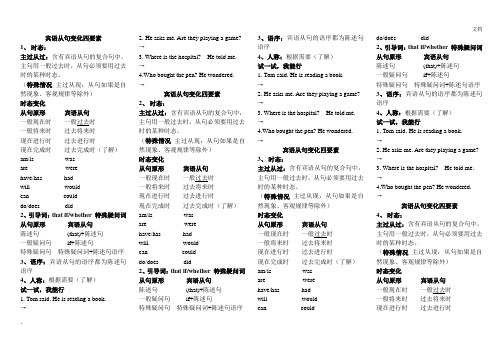
文档,宾语从句变化四要素1、时态:主过从过:含有宾语从句的复合句中,主句用一般过去时,从句必须要用过去时的某种时态。
(特殊情况主过从现:从句如果是自然现象、客观规律等除外)时态变化从句原形宾语从句一般现在时一般过去时一般将来时过去将来时现在进行时过去进行时现在完成时过去完成时(了解)am/is wasare werehave/has hadwill wouldcan coulddo/does did2、引导词:that if/whether 特殊疑问词从句原形宾语从句陈述句(that)+陈述句一般疑问句if+陈述句特殊疑问句特殊疑问词+陈述句语序3、语序:宾语从句的语序都为陈述句语序4、人称:根据需要(了解)试一试,我能行1. Tom said. He is reading a book.→2. He asks me. Are they playing a game?→3. Where is the hospital? He told me.→4.Who bought the pen? He wondered.→宾语从句变化四要素2、时态:主过从过:含有宾语从句的复合句中,主句用一般过去时,从句必须要用过去时的某种时态。
(特殊情况主过从现:从句如果是自然现象、客观规律等除外)时态变化从句原形宾语从句一般现在时一般过去时一般将来时过去将来时现在进行时过去进行时现在完成时过去完成时(了解)am/is wasare werehave/has hadwill wouldcan coulddo/does did2、引导词:that if/whether 特殊疑问词从句原形宾语从句陈述句(that)+陈述句一般疑问句if+陈述句特殊疑问句特殊疑问词+陈述句语序3、语序:宾语从句的语序都为陈述句语序4、人称:根据需要(了解)试一试,我能行1. Tom said. He is reading a book.→2. He asks me. Are they playing a game?→3. Where is the hospital? He told me.→4.Who bought the pen? He wondered.→宾语从句变化四要素3、时态:主过从过:含有宾语从句的复合句中,主句用一般过去时,从句必须要用过去时的某种时态。
人教版九年级英语《中考专项复习宾语从句》说课稿

九年级英语宾语从句专项复习说课稿我说课的课题是Go for it 九年级英语《中考专项复习---宾语从句》。
内容包括四个部分,分别是:导入,教材分析,考点分析,练习。
一、导入用3道判断题提问学生这是含有什么样从句的复合句,分别用了什么引导词,用了什么语序、时态。
1. She said that she had been to the Great Wall.2. He asked if we knew the answer.3. Do you know what happened?【设计思路及多媒体应用分析】通过多媒体呈现创设的问题,引导学生从题中查找相关信息,激发学生思考的欲望。
二、教材分析1、教学内容:宾语从句在八年级(上)就已教学过,在单项选择、阅读理解和书面表达常用到宾语从句,也是每年中考的常考考点。
本课的教学对象是初三学生,宾语从句是他们熟知的内容,是围绕中考复习的。
2、教学目标:① 知识目标:通过专项练习方式复习宾语从句的不同形式,以达到熟练运用的目的.② 能力目标:在阅读、写中提高学生对语言知识的归纳能力,着重培养学生通过多媒体把信息整合运用的能力。
③ 情感目标:辅助多媒体教学,为学生所学知识上升到理论归纳提供良好平台,实现师生互动,生生互动,人机互动的多向交流。
3、教学重点:宾语从句中引导词、语序、时态的用法4、教学难点:对宾语从句的理解与正确运用。
三、考点分析1. 宾语从句的引导词:① 根据引导宾语从句的不同连词,宾语从句可分为哪三类呢?that 陈述句引导词if / whether一般疑问句疑问词特殊疑问句【多媒体应用分析】:可以增大课堂容量,优化课堂环节.② 呈现总结:如果宾语从句是由陈述句转换成的,用that引导;如果宾语从句由一般疑问句转换的用if / whether引导;如果宾语从句由特殊疑问句转换成的用疑问词。
【设计思路】采取分组合作学习方式,引导学生学会获取信息,加工信息的能力,加强学生合作与交流、自主学习的能力一般说来,“教师”概念之形成经历了十分漫长的历史。
语法进阶宾语从句中的时态转换与语气变化
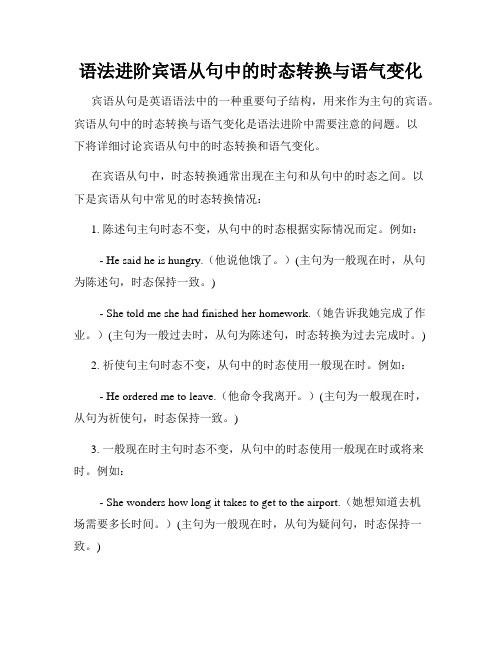
语法进阶宾语从句中的时态转换与语气变化宾语从句是英语语法中的一种重要句子结构,用来作为主句的宾语。
宾语从句中的时态转换与语气变化是语法进阶中需要注意的问题。
以下将详细讨论宾语从句中的时态转换和语气变化。
在宾语从句中,时态转换通常出现在主句和从句中的时态之间。
以下是宾语从句中常见的时态转换情况:1. 陈述句主句时态不变,从句中的时态根据实际情况而定。
例如:- He said he is hungry.(他说他饿了。
)(主句为一般现在时,从句为陈述句,时态保持一致。
)- She told me she had finished her homework.(她告诉我她完成了作业。
)(主句为一般过去时,从句为陈述句,时态转换为过去完成时。
)2. 祈使句主句时态不变,从句中的时态使用一般现在时。
例如:- He ordered me to leave.(他命令我离开。
)(主句为一般现在时,从句为祈使句,时态保持一致。
)3. 一般现在时主句时态不变,从句中的时态使用一般现在时或将来时。
例如:- She wonders how long it takes to get to the airport.(她想知道去机场需要多长时间。
)(主句为一般现在时,从句为疑问句,时态保持一致。
)- He asked me when the concert starts.(他问我音乐会什么时候开始。
)(主句为一般现在时,从句为疑问句,时态保持一致。
)4. 一般过去时主句时态不变,从句中的时态使用一般过去时或过去完成时。
例如:- She told me she would go shopping yesterday.(她告诉我她昨天去购物了。
)(主句为一般过去时,从句为陈述句,时态保持一致。
) - He asked me if I had finished my homework.(他问我是否完成了作业。
)(主句为一般过去时,从句为疑问句,时态转换为过去完成时。
宾语从句教案

(3)%
(4)动词seem后的宾语从句可用不定式(短语)来简化,但句型要有适当的变化,通常将宾语从句的主语作为简化的句子的主语,seem(适当时态形式)作谓语。如:
It seems that football is very interesting.
=Football seems to be very interesting.
C. how far/ went D. how far/ had run
7. The manager came up to see __________.
A. what was the matter B. what the matter was
C. what the matter is D. what's the matter
注意事项:_______________________________________________________________
2. She told me the sun rose in the east.
注意事项:______________________________________________________________
2. I don't know _____ he will be back home.
A. who B. what C. when D. where
3. Could you tell me ___________
A. where do you live B. who you are waiting for
足球似乎非常有趣。
(5)宾语从句可以简化为名词或名词短语。如:
I don't believe what Tom said.
(完整版)宾语从句用法详解

宾语从句用法及其例句宾语从句,是名词性从句的一种。
在主从复合句中充当宾语,位于及物动词、介词或复合谓语之后的从句称为宾语从句。
宾语从句分为三类:动词的宾语从句,介词的宾语从句和形容词的宾语从句。
宾语从句用法时态:1.主句用一般现在时,从句可用任意时态。
2.主句用过去时,从句用过去某个时态。
3.主句用过去时,从句是客观真理时,只用一般现在时。
一、宾语从句的连接词(1)从属连词连接宾语从句的从属连词主要有that,if,whether.that引导表示陈述句的宾语从句,if和whether引导表示“是否”的一般疑问句的宾语从句.He told me (that he would) go to the college the next year他告诉我他明年上大学.I don’t know if there will be a bus any more.我不知道是否还会有公交车.Nobody knew whether he could pass the exam.没人知道他是否会通过考试.(2)连接代词连接代词主要有who, whom ,whose ,what ,whoever ,whomever ,whosever, whatever, whichever等.连接代词一般指疑问,但what, whatever除了指疑问外,也可以指陈述.Do you know who has won Red Alert game?你知道是谁赢得了红色警报的游戏?The book will show you what the best CEOs should know.这本书会告诉你最好的执行总裁该了解些什么.Have you determined whichever you should buy,a Motorola or Nokiacell phone?你决定好是买诺基亚还是摩托罗拉的电话了吗?(3)连接副词连接副词主要有when,where,why,how,whenever,wherever,however等.He didn’t tell me when we should meet again.他没有告诉我什么时候我们能再见面.Could you please tell me how you use the new panel?你能告诉我怎么用这个新的操作盘吗?None of us knows where these new parts can be bought.没有人知道这些的新的零件能在哪里买到.动宾重点,介宾掌握,形宾了解二、动词的宾语从句(1)大多数动词都可以带宾语从句We all expect that they will win , for members of their team are stronger.我们都预料他们会赢,因为他们的队员更强壮.He told us that they would help us through the whole work.他告诉我们在整个工作中,他们都会帮忙的.(2)部分“动词+副词”结构也可以带宾语从句I have found out that all the tickets for the concert have been sold out.我发现这场音乐会的所有票都卖光了.Can you work out how much we will spend during the trip?你能计算出这次旅行我们将花费多少钱吗?(3)动词短语也可以带宾语从句常见的这些词有:make sure确保make up one’s mind下决心keep in mind牢记Make sure that there are no mistakes in your papers before youturn them in.在上交试卷前确保没有任何错误.可运用形式宾语it代替的宾语从句①动词find,feel,consider,make,believe等后面有宾语补足语的时候,则需要用it 做形式宾语而将that宾语从句后置.I think it necessary that we take plenty of hot water every day .我认为每天多喝开水是有必要的.I feel it a pity that I haven’t been to the get-together.我没去聚会,感觉非常遗憾.I have made it a rule that I keep diaries.我每天写日记成了习惯.We all find it important that we (should) make a quick decisionabout this mater.我们都认为对这件事马上做出决定很重要.②有些动词带宾语从句时需要在宾语与从句前加it这类动词主要有:hate, take , owe, have, see to.I hate it when they with their mouths full of food.我讨厌他们满嘴食物时说话.He will have it that our plan is really practical.他会认为我们的计划确实可行.We take it that you will agree with us.我们认为你会同意我们的.When you start the engine, you must see to it that car is inneutral.开启发动机时, 一定要使汽车的离合器处于空挡位置.③若宾语从句是wh-类,则不可用it代替We all consider what you said to be unbelievable.我们都认为你所说的是不可信的.We discovered what we had learned to be valuable.我们发现我们所学到的东西都是有用的.三、介词的宾语从句(1)用wh-类的介词宾语从句We are talking about whether we admit students into our club.我们正在讨论是否让学生加入我们的俱乐部.The new book is about how Shenzhou 6 manned spaceship wassent up into space.这本新书是关于神州6号载人航天飞船是如何升入太空的.(2)用that,if引导的介词宾语从句有时候except,but,besides三个介词后可见到that引导的宾语从句I know nothing about my new neighbor except that he used towork with a company.对于我的新邻居我只知道他曾在一家公司上班,其他一无所知.四、形容词的宾语从句有些形容词具有动词的含义,所以也可以带一个宾语从句,常用来引导宾语从句的形容词有: sure,certain,glad,please,happy,sorry,afraid,satisfied,surprisedI am sure I will pass the exam.我确信我会通过考试.I am sorry that I have troubled you so long.很抱歉我这么长时间在打扰你.He is glad that Li Ming went to see him when he was ill.他很高兴在他生病的时候李明能去看望他.五、if,whether在宾语从句中的区别①if和whether在作“是否”解时,引导宾语从句常放在动词know,ask,care,wond er,find out等之后,介词后一般不用if②少数动词,如:leave,put,discuss,doubt后的宾语从句常用whether.③whether后可以加or not,但是if不可以.④在不定式前只能用whether.(如:I can’t decide whether to stay. 我不能决定是否留下。
宾语从句用法详解
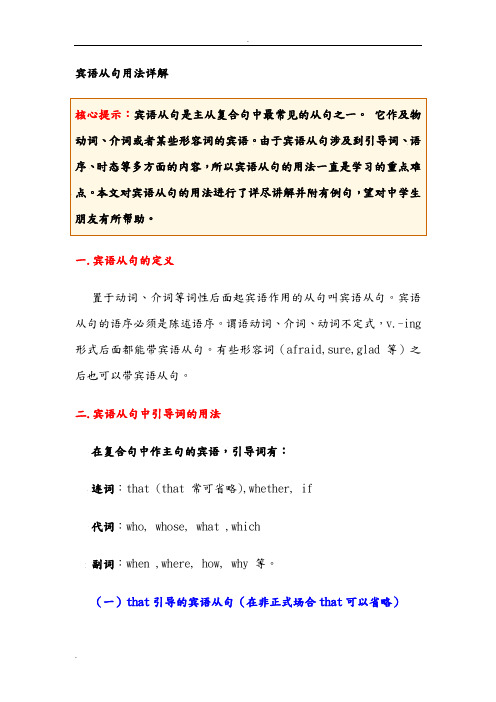
宾语从句用法详解一.宾语从句的定义置于动词、介词等词性后面起宾语作用的从句叫宾语从句。
宾语从句的语序必须是陈述语序。
谓语动词、介词、动词不定式,v.-ing 形式后面都能带宾语从句。
有些形容词(afraid,sure,glad等)之后也可以带宾语从句。
二.宾语从句中引导词的用法在复合句中作主句的宾语,引导词有:连词:that (that 常可省略),whether, if代词:who, whose, what ,which副词:when ,where, how, why 等。
(一)that引导的宾语从句(在非正式场合that可以省略)可跟that从句做宾语的动词有:say, think, insist, wish, hope, demand, imagine, wonder, know, suppose, see, believe, agree, admit, deny, expect, explain, order, command, feel, dream, suggest, hear, mean, notice, prefer, request, require, propose, declare, report 等。
例句:The boy believes that he will travel through space to other planets.注意事项:当主句谓语动词是 think, believe, suppose, expect 等词,而宾语从句的意思是否定时,常把否定转移至主句表示。
例句:I don’t think it is right for him to treat you like that.在以下情况中that不能省略1.当句中的动词后接多于两个由that引导的宾语从句时,第一个that可省,但后面的that不可省。
例句:He said (that) you were too young to understandthe matter and that he was asked not to tell you.2.当主句的谓语动词与that宾语从句之间有插入语时,that一般不可省。
宾语从句时态倒退原则

宾语从句时态倒退原则
宾语从句的时态倒退原则是指在特定条件下,宾语从句的时态需要与主句的时态相一致,这体现了句子之间在时态上的呼应关系。
这一原则主要应用于以下几种情况。
1. 主句为现在时,从句不受限制:当主句的谓语动词为现在时或将来时,宾语从句中的谓语动词可以使用任何时态。
例如:
主句:He always says that he is our good friend.(他总是说他是我们的好朋友。
)
2. 主句为过去时,从句用过去时:当主句的谓语动词为过去时,宾语从句中的谓语动词需要用过去时态的某种形式。
例如:
主句:He said that he had read the book. (他说他读过这本书。
)
3. 客观真理或事实,使用一般现在时:当宾语从句叙述的是客观真理或事实时,即使主句为过去时,从句仍然使用一般现在时。
例如:
主句:The teacher told us that the earth goes ar ound the sun. (老师告诉我们地球绕着太阳转。
)这个原则反映了英语中时态的一致性规则,即从句的时态应该与主句的时态保持一致,以确保整个句子的时态逻辑正确。
需要注意的是,这个原则并不是绝对的,存在一些特
殊情况和例外,例如在某些固定搭配或习惯用法中,从句的时态可能需要根据具体情况来确定。
(完整版)宾语从句的时态和语序要点
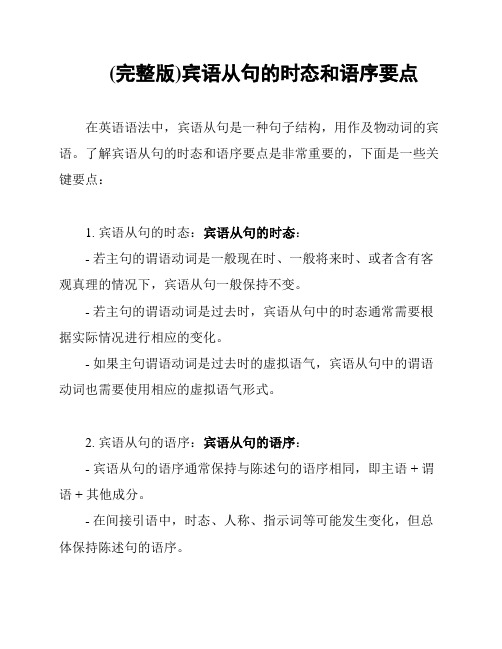
(完整版)宾语从句的时态和语序要点在英语语法中,宾语从句是一种句子结构,用作及物动词的宾语。
了解宾语从句的时态和语序要点是非常重要的,下面是一些关键要点:1. 宾语从句的时态:宾语从句的时态:- 若主句的谓语动词是一般现在时、一般将来时、或者含有客观真理的情况下,宾语从句一般保持不变。
- 若主句的谓语动词是过去时,宾语从句中的时态通常需要根据实际情况进行相应的变化。
- 如果主句谓语动词是过去时的虚拟语气,宾语从句中的谓语动词也需要使用相应的虚拟语气形式。
2. 宾语从句的语序:宾语从句的语序:- 宾语从句的语序通常保持与陈述句的语序相同,即主语 + 谓语 + 其他成分。
- 在间接引语中,时态、人称、指示词等可能发生变化,但总体保持陈述句的语序。
3. 连接词的使用:连接词的使用:- 为引导宾语从句,常用的连接词有:that, whether, if, when, where, what, who, whom, whose, why, how等。
具体使用哪个连接词取决于宾语从句的内容。
- 当主句谓语动词为瞬间动词(如:think, believe, consider)时,that可以省略,而其他连接词不可省略。
例如:I believe (that) he isa good person.4. 宾语从句时态和语序的例子:宾语从句时态和语序的例子:- 我不知道他在哪里。
I don't know where he is.(主句为一般现在时,宾语从句保持不变)- 他告诉我他正在读一本好书。
He told me that he is reading a good book.(主句为过去时,宾语从句谓语动词保持一般现在时)请注意以上是宾语从句时态和语序的一些要点和例子,根据实际情况和具体语境,宾语从句的使用可能会有一些细微的差异。
希望这份文档对您有所帮助!。
外研版英语八下_Module 10 宾语从句的时态问题辅导讲义
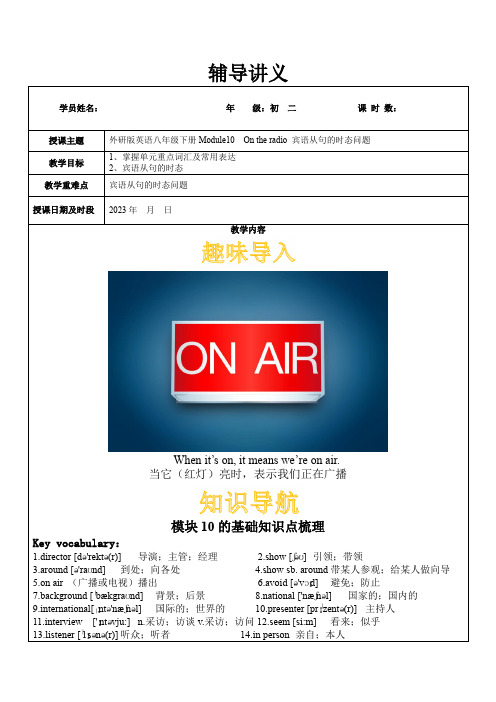
辅导讲义教学内容When it’s on, it means we’re on air.当它(红灯)亮时,表示我们正在广播模块10的基础知识点梳理Key vocabulary:1.director [də'rektə(r)]导演;主管;经理2.show [ʃəʊ]引领;带领3.around [ə'raʊnd]到处;向各处4.show sb. around带某人参观;给某人做向导5.on air(广播或电视)播出6.avoid [ə'vɔɪd]避免;防止7.background [ˈbækgraʊnd]背景;后景8.national ['næʃnəl]国家的;国内的9.international[ˌɪntə'næʃnəl]国际的;世界的10.presenter [prɪˈzentə(r)]主持人11.interview ['ɪntəvju:]n.采访;访谈v.采访;访问12.seem [si:m]看来;似乎13.listener [ˈlɪsənə(r)]听众;听者14.in person亲自;本人➢➢➢12.【课文原句】One day I learnt about Internet radio. 有一天我听说了网络电台。
【用法】learn about 听说,了解13.【课文原句】I did this by looking out of the window. 我是根据观察窗外的情况做到的。
【用法1】look out of the window 向窗外看【用法2】by doing sth. 通过做某事一、宾语从句的时态1、主句现在时态,从句时态根据实际情况选择——I can hardly believe we’re in the city centre.(主句和从句都是现在时)真不敢信心我们是在市中心——I’m sure it’ll be fantastic to see the city from the top.(主句现在时,从句将来时)我相信从山顶上看到的城市风景将会是极好的。
高考英语宾语从句
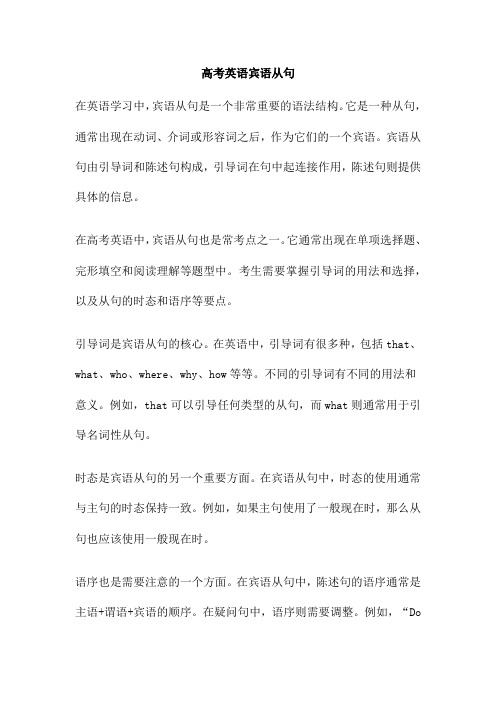
高考英语宾语从句在英语学习中,宾语从句是一个非常重要的语法结构。
它是一种从句,通常出现在动词、介词或形容词之后,作为它们的一个宾语。
宾语从句由引导词和陈述句构成,引导词在句中起连接作用,陈述句则提供具体的信息。
在高考英语中,宾语从句也是常考点之一。
它通常出现在单项选择题、完形填空和阅读理解等题型中。
考生需要掌握引导词的用法和选择,以及从句的时态和语序等要点。
引导词是宾语从句的核心。
在英语中,引导词有很多种,包括that、what、who、where、why、how等等。
不同的引导词有不同的用法和意义。
例如,that可以引导任何类型的从句,而what则通常用于引导名词性从句。
时态是宾语从句的另一个重要方面。
在宾语从句中,时态的使用通常与主句的时态保持一致。
例如,如果主句使用了一般现在时,那么从句也应该使用一般现在时。
语序也是需要注意的一个方面。
在宾语从句中,陈述句的语序通常是主语+谓语+宾语的顺序。
在疑问句中,语序则需要调整。
例如,“Doyou know where he went?”是一个疑问句,但是在宾语从句中则需要调整为陈述句语序:“I don't know where he went.”高考英语宾语从句是一个非常重要的语法结构。
考生需要掌握引导词的用法和选择,以及从句的时态和语序等要点。
也需要多做练习题,加深对这一语法的理解和掌握。
历年高考英语宾语英语宾语从句历年高考英语宾语从句的考察及应对策略在高考英语中,宾语从句是一个非常重要的语法点,也是学生们常常感到困惑的部分。
本文将从历年高考英语真题中,分析宾语从句的考察重点和难点,并提供一些应对策略。
一、宾语从句的考察重点1、连接词的使用:连接词是构成宾语从句的关键,历年高考对连接词的考察非常重视。
例如,that、whether、if、as if等连接词的使用。
2、时态和语序:宾语从句的时态和语序也是高考的重点。
特别是当主句和从句的时态不一致时,如何正确使用时态是考察的难点。
完整版)宾语从句知识点大全
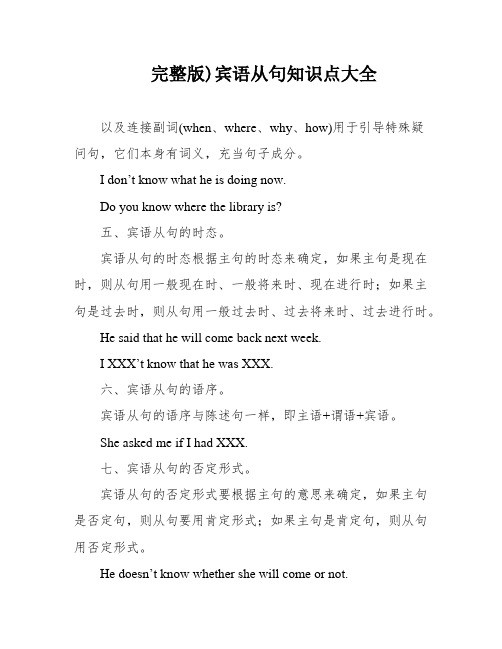
完整版)宾语从句知识点大全以及连接副词(when、where、why、how)用于引导特殊疑问句,它们本身有词义,充当句子成分。
I don’t know what he is doing now.Do you know where the library is?五、宾语从句的时态。
宾语从句的时态根据主句的时态来确定,如果主句是现在时,则从句用一般现在时、一般将来时、现在进行时;如果主句是过去时,则从句用一般过去时、过去将来时、过去进行时。
He said that he will come back next week.I XXX’t know that he was XXX.六、宾语从句的语序。
宾语从句的语序与陈述句一样,即主语+谓语+宾语。
She asked me if I had XXX.七、宾语从句的否定形式。
宾语从句的否定形式要根据主句的意思来确定,如果主句是否定句,则从句要用肯定形式;如果主句是肯定句,则从句用否定形式。
He doesn’t know whether she will come or not.I know that he is not XXX.八、口诀:动词后面宾语从句。
that、if、whether、连接词。
时态、语序、否定问。
全掌握,做题不难。
九、总结:宾语从句是初中英语中的重点和难点,涉及到多方面的知识,需要同学们多加练和总结。
掌握宾语从句的知识和技巧,不仅有助于平时的研究,更能在中考中取得好成绩。
Fifth。
XXX ClausesIn object clauses。
the structure of "n word + infinitive" often appears。
which XXX with the structure of "n word + subject + modal verb + verb infinitive."XXX:Can you tell me how I can get to the n?Can you tell me how to get to the n?Sixth。
宾语从句如果主句是过去时-从句时态
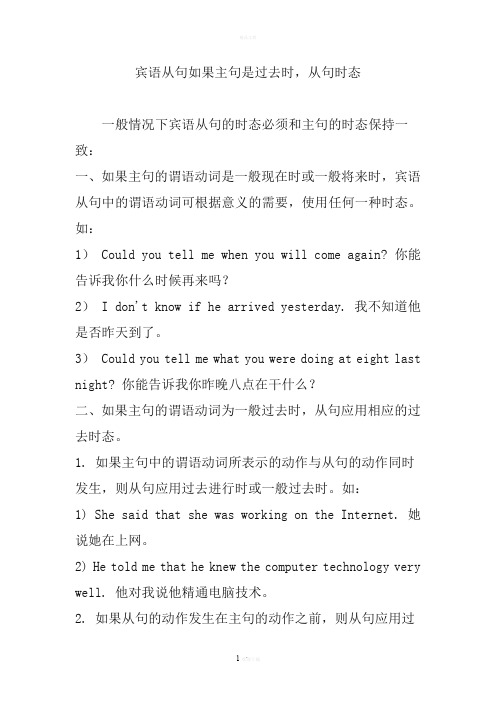
宾语从句如果主句是过去时,从句时态一般情况下宾语从句的时态必须和主句的时态保持一致:一、如果主句的谓语动词是一般现在时或一般将来时,宾语从句中的谓语动词可根据意义的需要,使用任何一种时态。
如:1) Could you tell me when you will come again? 你能告诉我你什么时候再来吗?2) I don't know if he arrived yesterday. 我不知道他是否昨天到了。
3) Could you tell me what you were doing at eight last night? 你能告诉我你昨晚八点在干什么?二、如果主句的谓语动词为一般过去时,从句应用相应的过去时态。
1. 如果主句中的谓语动词所表示的动作与从句的动作同时发生,则从句应用过去进行时或一般过去时。
如:1) She said that she was working on the Internet. 她说她在上网。
2) He told me that he knew the computer technology very well. 他对我说他精通电脑技术。
2. 如果从句的动作发生在主句的动作之前,则从句应用过去完成时。
如:1) He didn't know what they had come here for. 他不知道他们到这里来的目的。
3. 如果从句的动作发生在主句的动作之后,则从句应用过去将来时。
如:1) Jim told me he would spend his holidays in the south. 吉姆告诉我他将到南方度假。
使用宾语从句的时态还应注意下列特殊情况:一、如果宾语从句中有明确表示过去的时间状语,不论主句用什么时态,从句一律用过去时。
如:1) She said she came to work here in 1998. 她说她是1998年来这里工作的。
[宾语从句的时态及语序] 宾语从句的语序和时态
![[宾语从句的时态及语序] 宾语从句的语序和时态](https://img.taocdn.com/s3/m/34c7897d9e31433238689347.png)
[宾语从句的时态及语序] 宾语从句的语序和时态宾语从句的时态及语序一.主句与从句时态一致问题(中考考点)1. 如果主句是现在的某种时态(包括一般现在时,现在进行时,现在完成时),那么宾语从句的时态课根据实际情况而定。
eg. I remember he gave me a book yesterday.2. 如果主句是过去的某种时态(包括一般过去时,过去进行时),那么宾语从句一般要用过去的某种时态(包括一般过去时,过去进行时,过去将来时,过去完成时)Eg.He told me that he would take part in the high jump.3. 但当宾语从句是指客观事实、普遍真理、自然现象时,则只能用一般现在时。
eg. She said (that) the sun rises in the east.三.宾语从句的语序(中考考点)宾语从句要用陈述句语序(中):—Do you know _D__ tomorrow?A. when did she comeB. when she cameC. when will she comeD.when she will comeA组习题1. — Do you know ____ tomorrow?—At 8 o”clock.A. when did she comeB. when she cameC. when will she comeD. when she will come2.We want to know _____to help them.A. what can we doB. what we can doC. how can we doD. how we can do3.1 didn”t see Laura at the party last night. Do you know_?A. why didn”t she comeB. what happenedC. when would she arriveD. where she has been4.— Excuse me, I want to go to the 21st National Book Expo (世博会). Could you tell me______?— Sure. It is at No. 3 Changjiang Road in Harbin.A. where it isB. where it wasC. where is it5. ----Could you tell us how long ?---- About three days.A. does the sports meeting lastB. the sports meeting will lastC. the sports meeting lastD. will the sports meeting last6.— Could you please tell me ?—Tomorrow morning.A. how I can get to the post officeB. how long can I keep the bookC. when to leave for BeijingD. where I should take the early bus7.—Do you know ___ Beijing with his family?—Next week.A. when Mr Zhao will visitB. when will Mr Zhao will visitC. when Mr Zhao visited8.Can you tell me_ ?A. where you are fromB. where you are fromC. where do you come from9. Do you know ___________?A. when will he be backB. when he will be backC. where did he goD. where will he go10.Allen wanted to know ____ after it got out of the UFO.A. what is the alien doingB. what the alien would doC. where would the alien goD. where the alien is going11.—Could you tell me ________ the party?—Next Friday.A. where we are going to haveB. when we are going to haveC. when we were going to have12.—I’m new here. Could you please tell me _______?—Sure. It’s over there behind that tower.A. where the youth centre isB. when the lipary opensC. how far is the amusement parkD. how can I get to the underground station13.I don”t know if she to my birthday party tomorrow. If she , I”ll be very happy.A. comes; comesB. will come; comesC. comes; will come14.—I don”t know_ .— You can go and ask Jack.A. when does the train leaveB. that we will plant trees or notC. if she had come yesterdayD. what I should buy for him15.—Mum, can we go to the art museum tomorrow?—Sure. But first we should find out ________.A. what can we doB. where we can goC. how can we go thereD. if it will be openB 组习题1.—Could you tell me _________?— You can take No. 16 bus.A. how can we get to the Olympic ParkB. how we can get to the Olympic ParkC. how did we get to the Olympic ParkD. how we got to the Olympic Park2.—Can you tell me how many colors ________ in a rainbow?—Seven.A. there areB. are thereC. they areD. are they3.—Could you tell me ?—He”s a bank clerk.A. who your father isB. what your father doesC. where your father works。
宾语从句主句和从句的时态关系

宾语从句主句和从句的时态关系大家好!今天咱们聊聊英语中宾语从句的主句和从句之间的时态关系。
这可是一个常让人摸不着头脑的问题,但别担心,我会用简单的语言和生活中的例子来帮你搞明白。
让我们一起钻研这个有趣的语法小世界吧!1. 主句和从句的时态关系总览主句和从句的时态关系主要取决于主句的时态。
简单来说,就是主句的时间状态会影响从句的时间状态。
比如说,你在过去说的事情,它的宾语从句也得跟着过去的时间走。
这一点,就像是跟着潮水走,不能逆流而上。
1.1 主句是现在时,从句时态的变化如果主句是在现在时,比如一般现在时,那么宾语从句的时态就比较灵活了,可以是现在时、过去时,甚至是将来时。
看个例子:主句现在时: “I think she is right.”(我觉得她是对的。
)。
宾语从句现在时: “She is right.”(她是对的。
)。
在这个例子里,宾语从句的时态没变,因为主句是现在时。
1.2 主句是过去时,从句时态的变化当主句是过去时,比如一般过去时,宾语从句的时态就得相应地调整,通常是用过去时。
如果从句里还有其他的动作发生,那就得用过去完成时。
举个例子:主句过去时: “I thought she was right.”(我觉得她是对的。
)。
宾语从句过去时: “She was right.”(她是对的。
)。
再比如:主句过去时: “I knew that she had left.”(我知道她已经离开了。
)。
宾语从句过去完成时: “She had left.”(她已经离开了。
)。
2. 特殊情况下的时态选择有时候,宾语从句的时态也可能和主句不太一样,尤其是在以下几种情况下:2.1 从句表达普遍真理或习惯如果宾语从句在表达普遍真理或习惯,即使主句是过去时,从句也可以用现在时。
这就像是“道理不会随着时间的流逝而改变”。
主句过去时: “I knew that water boils at 100 degrees Celsius.”(我知道水在100摄氏度时会沸腾。
宾语从句主句和从句的时态关系

宾语从句主句和从句的时态关系在英语学习中,宾语从句是个重要但稍显复杂的部分,尤其是时态的运用。
很多人一听到时态就头疼,觉得复杂难懂,其实只要掌握了基本规则,事情会变得简单多了。
今天,我们就来聊聊宾语从句中时态的那些事儿,让你轻松搞定这一难题。
1. 主句和从句时态关系的基本规则1.1 主句的时态决定从句的时态首先,得知道一个基本原则:主句的时态会影响宾语从句的时态。
比如说,如果主句用的是一般现在时,那么宾语从句通常也用现在时。
就像“我知道他现在在家。
”这里的主句是现在时,所以宾语从句“他现在在家”也保持现在时。
1.2 过去时态的“接力”规则当主句的时态是过去时态时,从句的时态就要跟着调整。
这有点像接力赛,主句的过去时态传递给从句。
比如,“她说她昨天去了超市。
”主句是过去时“说”,所以宾语从句“她昨天去了超市”也得用过去时。
2. 主句与从句时态变化的常见情况2.1 从句的时态随主句的变化在主句是现在时的情况下,从句的时态一般不变。
例如,“我相信他会来。
”主句“我相信”是现在时,因此从句“他会来”用将来时,这样的用法可以表达对未来的预期。
2.2 条件句和时间状语从句的特别处理在一些条件句或时间状语从句中,宾语从句的时态有时会有所不同。
例如,“如果你告诉我你来晚了,我会帮你。
”这里,“你告诉我”用的是过去时,因为这是对过去可能发生的情况的假设。
3. 特殊情况的处理3.1 虚拟语气的时态有时候,宾语从句的时态和主句的时态会有所不同,尤其是在虚拟语气的情况下。
比如,“我希望你能早点到。
”这里主句是现在时,但宾语从句用的是虚拟的“能”。
虚拟语气表达的是一种假设或者愿望。
3.2 时间的延续和变化另外,当从句的动作发生在主句动作之前时,宾语从句也会用过去完成时。
例如,“我知道她已经完成了作业。
”主句“我知道”是现在时,但从句“她已经完成了作业”用的是过去完成时,因为动作发生在“知道”之前。
结语了解了这些规则,你会发现宾语从句的时态其实并没有那么难搞。
宾语从句讲解之说课稿
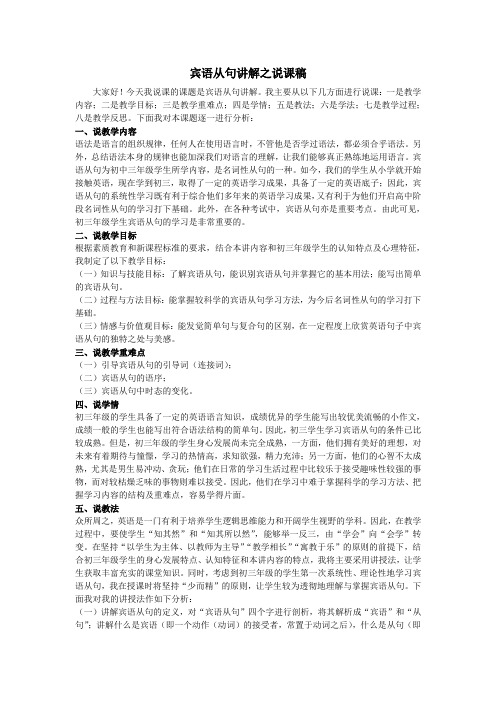
宾语从句讲解之说课稿大家好!今天我说课的课题是宾语从句讲解。
我主要从以下几方面进行说课:一是教学内容;二是教学目标;三是教学重难点;四是学情;五是教法;六是学法;七是教学过程;八是教学反思。
下面我对本课题逐一进行分析:一、说教学内容语法是语言的组织规律,任何人在使用语言时,不管他是否学过语法,都必须合乎语法。
另外,总结语法本身的规律也能加深我们对语言的理解,让我们能够真正熟练地运用语言。
宾语从句为初中三年级学生所学内容,是名词性从句的一种。
如今,我们的学生从小学就开始接触英语,现在学到初三,取得了一定的英语学习成果,具备了一定的英语底子;因此,宾语从句的系统性学习既有利于综合他们多年来的英语学习成果,又有利于为他们开启高中阶段名词性从句的学习打下基础。
此外,在各种考试中,宾语从句亦是重要考点。
由此可见,初三年级学生宾语从句的学习是非常重要的。
二、说教学目标根据素质教育和新课程标准的要求,结合本讲内容和初三年级学生的认知特点及心理特征,我制定了以下教学目标:(一)知识与技能目标:了解宾语从句,能识别宾语从句并掌握它的基本用法;能写出简单的宾语从句。
(二)过程与方法目标:能掌握较科学的宾语从句学习方法,为今后名词性从句的学习打下基础。
(三)情感与价值观目标:能发觉简单句与复合句的区别,在一定程度上欣赏英语句子中宾语从句的独特之处与美感。
三、说教学重难点(一)引导宾语从句的引导词(连接词);(二)宾语从句的语序;(三)宾语从句中时态的变化。
四、说学情初三年级的学生具备了一定的英语语言知识,成绩优异的学生能写出较优美流畅的小作文,成绩一般的学生也能写出符合语法结构的简单句。
因此,初三学生学习宾语从句的条件已比较成熟。
但是,初三年级的学生身心发展尚未完全成熟,一方面,他们拥有美好的理想,对未来有着期待与憧憬,学习的热情高,求知欲强,精力充沛;另一方面,他们的心智不太成熟,尤其是男生易冲动、贪玩;他们在日常的学习生活过程中比较乐于接受趣味性较强的事物,而对较枯燥乏味的事物则难以接受。
宾语从句的时态归纳总结
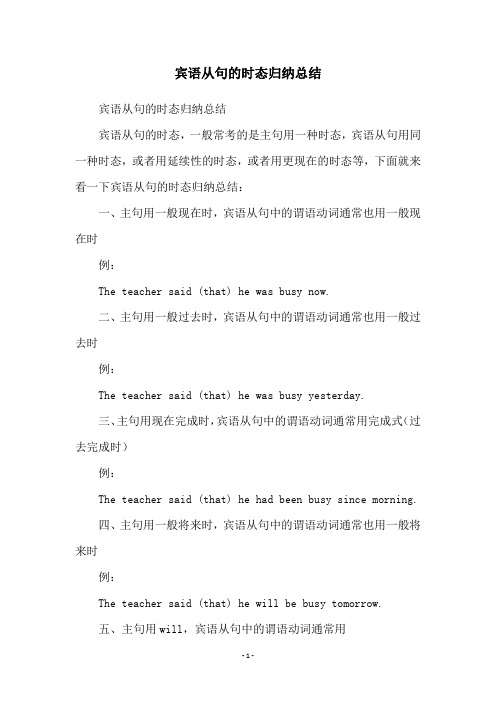
宾语从句的时态归纳总结宾语从句的时态归纳总结宾语从句的时态,一般常考的是主句用一种时态,宾语从句用同一种时态,或者用延续性的时态,或者用更现在的时态等,下面就来看一下宾语从句的时态归纳总结:一、主句用一般现在时,宾语从句中的谓语动词通常也用一般现在时例:The teacher said (that) he was busy now.二、主句用一般过去时,宾语从句中的谓语动词通常也用一般过去时例:The teacher said (that) he was busy yesterday.三、主句用现在完成时,宾语从句中的谓语动词通常用完成式(过去完成时)例:The teacher said (that) he had been busy since morning.四、主句用一般将来时,宾语从句中的谓语动词通常也用一般将来时例:The teacher said (that) he will be busy tomorrow.五、主句用will,宾语从句中的谓语动词通常用“shall/will/can/may/must/need/ought to/should”等情态动词例:The teacher said (that) he will leave soon.六、主句用情态动词can/may/must/should/ought to/need,宾语从句中的谓语动词也用情态动词例:The teacher said (that) we must get ready for the exam tomorrow.七、主句用现在进行时,宾语从句中的谓语动词也用现在进行时例:My mom said (that) I am doing my homework now.八、主句用过去进行时,宾语从句中的谓语动词用过去进行时例:My mom said (that) I was doing my homework at that time.以上就是宾语从句的时态归纳总结,希望对各位学生有所帮助,多多练习,将宾语从句的时态掌握的更加的熟练。
宾语从句时态三大原则
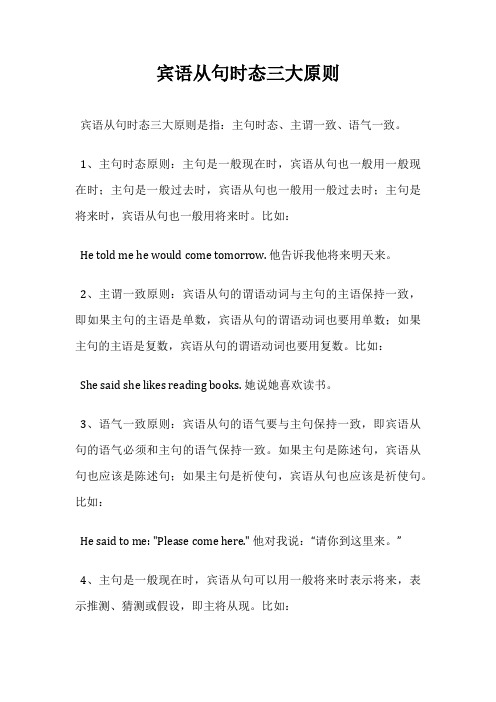
宾语从句时态三大原则宾语从句时态三大原则是指:主句时态、主谓一致、语气一致。
1、主句时态原则:主句是一般现在时,宾语从句也一般用一般现在时;主句是一般过去时,宾语从句也一般用一般过去时;主句是将来时,宾语从句也一般用将来时。
比如:He told me he would come tomorrow. 他告诉我他将来明天来。
2、主谓一致原则:宾语从句的谓语动词与主句的主语保持一致,即如果主句的主语是单数,宾语从句的谓语动词也要用单数;如果主句的主语是复数,宾语从句的谓语动词也要用复数。
比如:She said she likes reading books. 她说她喜欢读书。
3、语气一致原则:宾语从句的语气要与主句保持一致,即宾语从句的语气必须和主句的语气保持一致。
如果主句是陈述句,宾语从句也应该是陈述句;如果主句是祈使句,宾语从句也应该是祈使句。
比如:He said to me: "Please come here." 他对我说:“请你到这里来。
”4、主句是一般现在时,宾语从句可以用一般将来时表示将来,表示推测、猜测或假设,即主将从现。
比如:I think he will come tomorrow. 我认为他将来明天会来。
5、主句是一般将来时,宾语从句可以用一般现在时表示将来,表示推测、猜测或假设,即主将从现。
比如:He will come tomorrow, I think. 我认为他明天会来。
6、主句是一般过去时,宾语从句可以用过去将来时,表示主句过去时发生时,宾语从句本来应该发生的事情,即主过从将。
比如:He said he would come tomorrow. 他说他将来明天会来。
7、主句是一般现在时,宾语从句可以用过去完成时,表示宾语从句发生在主句发生之前,即主现从过。
比如:She said she had seen him before. 她说她以前见过他。
8、主句是一般过去时,宾语从句可以用一般过去时或过去完成时,表示宾语从句发生在主句发生之前,即主过从过。
宾语从句与主句的时态关系
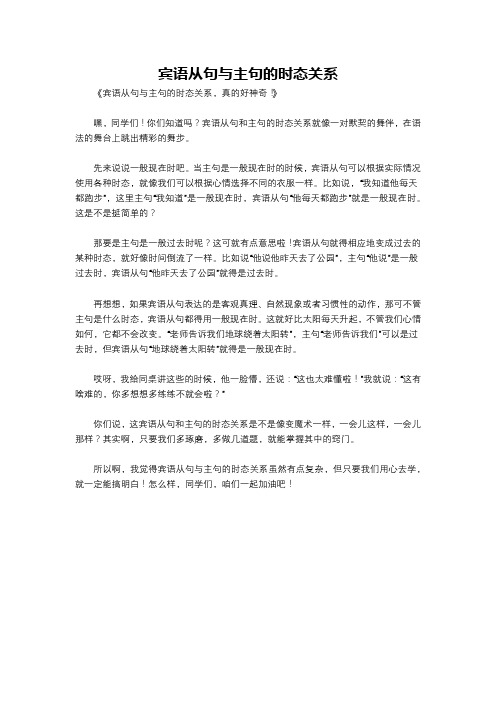
宾语从句与主句的时态关系
《宾语从句与主句的时态关系,真的好神奇!》
嘿,同学们!你们知道吗?宾语从句和主句的时态关系就像一对默契的舞伴,在语法的舞台上跳出精彩的舞步。
先来说说一般现在时吧。
当主句是一般现在时的时候,宾语从句可以根据实际情况使用各种时态,就像我们可以根据心情选择不同的衣服一样。
比如说,“我知道他每天都跑步”,这里主句“我知道”是一般现在时,宾语从句“他每天都跑步”就是一般现在时。
这是不是挺简单的?
那要是主句是一般过去时呢?这可就有点意思啦!宾语从句就得相应地变成过去的某种时态,就好像时间倒流了一样。
比如说“他说他昨天去了公园”,主句“他说”是一般过去时,宾语从句“他昨天去了公园”就得是过去时。
再想想,如果宾语从句表达的是客观真理、自然现象或者习惯性的动作,那可不管主句是什么时态,宾语从句都得用一般现在时。
这就好比太阳每天升起,不管我们心情如何,它都不会改变。
“老师告诉我们地球绕着太阳转”,主句“老师告诉我们”可以是过去时,但宾语从句“地球绕着太阳转”就得是一般现在时。
哎呀,我给同桌讲这些的时候,他一脸懵,还说:“这也太难懂啦!”我就说:“这有啥难的,你多想想多练练不就会啦?”
你们说,这宾语从句和主句的时态关系是不是像变魔术一样,一会儿这样,一会儿那样?其实啊,只要我们多琢磨,多做几道题,就能掌握其中的窍门。
所以啊,我觉得宾语从句与主句的时态关系虽然有点复杂,但只要我们用心去学,就一定能搞明白!怎么样,同学们,咱们一起加油吧!。
- 1、下载文档前请自行甄别文档内容的完整性,平台不提供额外的编辑、内容补充、找答案等附加服务。
- 2、"仅部分预览"的文档,不可在线预览部分如存在完整性等问题,可反馈申请退款(可完整预览的文档不适用该条件!)。
- 3、如文档侵犯您的权益,请联系客服反馈,我们会尽快为您处理(人工客服工作时间:9:00-18:30)。
宾语从句如果主句是过去时,从句时态
一般情况下宾语从句的时态必须和主句的时态保持一致:
一、如果主句的谓语动词是一般现在时或一般将来时,宾语从句中的谓语动词可根据意义的需要,使用任何一种时态。
如:
1)Could you tell me when you will come again? 你能告诉我你什么时候再来吗?
2)I don't know if he arrived yesterday. 我不知道他是否昨天到了。
3)Could you tell me what you were doing at eight last night? 你能告诉我你昨晚八点在干什么?
二、如果主句的谓语动词为一般过去时,从句应用相应的过去时态。
1. 如果主句中的谓语动词所表示的动作与从句的动作同时发生,则从句应用过去进行时或一般过去时。
如:
1) She said that she was working on the Internet. 她说她在上网。
2) He told me that he knew the computer technology very well.
他对我说他精通电脑技术。
2. 如果从句的动作发生在主句的动作之前,则从句应用过去完成时。
如:
1)He didn't know what they had come here for. 他不知道他们到这里来的目的。
3. 如果从句的动作发生在主句的动作之后,则从句应用过去将来时。
如:
1)Jim told me he would spend his holidays in the south. 吉姆告诉我他将到南方度假。
使用宾语从句的时态还应注意下列特殊情况:
一、如果宾语从句中有明确表示过去的时间状语,不论主句用什么时态,从句一律用过去时。
如:
1)She said she came to work here in 1998. 她说她是1998年来这里工作的。
2)The teacher told us that the war broke out in the winter of 1923. 老师告诉我们那场战争爆发于1923年的冬天。
二、如果宾语从句表示客观真理、科学原理、自然现象、现阶段存在的客观事实、现在经常性或习惯性的动作、谚语、格言等,不论主句用何种时态,从句一律用一般现在时。
如:
1)Our teacher told us that light travels much faster than sound. 我们老师对我们说光比声音传播要快得多。
2)The mother told his son that two and three is five. 母亲告诉孩子二加三等于五。
3)We all knew that a friend in need is a friend indeed. 我们都知道,患难之交才是真朋友。
4)He told me that his father is an English teacher. 他告诉我他父亲是名英语老师。
